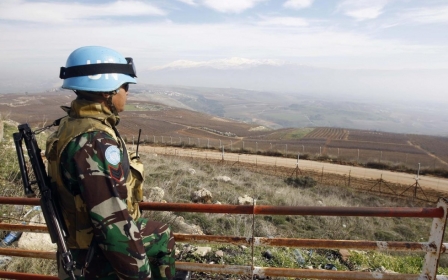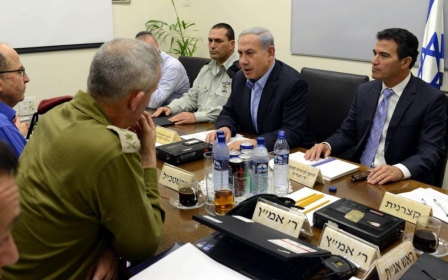A tale of two retaliations

Following yesterday’s missile strike by Hezbollah on an Israeli military convoy in the occupied Shebaa Farms, which killed two Israeli soldiers, the US State Department issued a press statement “strongly condemn[ing]” the attack as a “blatant violation of the ceasefire between Lebanon and Israel and UN Security Council Resolution 1701, which called for the immediate cessation by Hezbollah of all attacks.”
Never mind that the resolution - passed at the end of Israel’s 2006 war on Lebanon that killed approximately 1200 persons, mainly civilians - naturally requested that both sides cease hostilities and respect the Blue Line, the UN-christened border between Lebanon and Israel.
Of course, the US never gets its panties in a bunch over what amounts to one big ongoing violation of said border by Israel, which amuses itself by dispatching drones and supersonic jets into Lebanese airspace to terrorise people and eardrums. This is not to mention episodes of cross-border shelling and fatal shootings.
Regurgitating its usual mantra of “support [for] Israel’s legitimate right to self-defense”, the State Department pronouncement concludes with a condemnation of Hezbollah for “continu[ing] to incite violence and instability inside Lebanon by attacking Israel and by its presence and fighting inside Syria”.
Yeah, right. Because this attack by Hezbollah happened out of the blue, and wasn’t in retaliation for, you know, an Israeli airstrike that recently obliterated six of the organisation’s militants in Syria - a country that Israel is apparently allowed to penetrate but Hezbollah is not. An Iranian general also was killed.
Rewind to the State Department’s assessment of this particular event in a press briefing three days after the fact. When asked by a member of the audience whether the US administration approved of the strike, department spokeswoman Jen Psaki resorted to the tried-and-true tactic of impenetrable babble:
“Well, I think, Matt, I know our view on a range of issues that these reports take into account, whether it’s the engagement of Hezbollah, their destructive engagement from the outside is well known. Obviously, the details haven’t been specifically confirmed by many of the parties so I’m just not going to speculate on them further.”
Pressed further by “Matt”, Psaki went on to refer to the “alleged Israeli action” and to “reiterate… the fact that we’ve long believed that Hezbollah plays a destructive role.”
Onward toward ‘harshness and disproportionality’
Hysterics over Hezbollah’s alleged violation of the Blue Line conveniently distracts from an important detail: the Shebaa Farms is not in Israel.
While the UN claims the area is part of the Israeli-occupied Syrian Golan Heights, Syria and Lebanon agree that the Shebaa Farms belongs to Lebanon.
Even if you insist on taking the UN’s word for it, there’s no getting around the reality that - either way - it’s illegally occupied territory.
That the State Department and like-minded entities have managed to package Hezbollah’s act of retaliation against Israeli occupation targets as a unilateral act of unprovoked aggression just goes to show the extent to which the prevailing discourse has been warped on behalf of the Zionist programme.
Also telling was the muted global reaction yesterday to Israel’s slaying of a member of the Spanish contingent of the UN Interim Force in Lebanon (UNIFIL), who was killed when Israel shelled the Lebanese border in response to the attack on its convoy. Unlike Hezbollah’s response to the killing of its own militants, the Israeli move was generally accepted as a warranted retaliation - and the death of the Spaniard as an unfortunate but legitimate bit of collateral damage.
Indeed, in the bulk of the US press, his demise was absent from headlines, relegated to a supporting role in the body of news articles.
Israeli Foreign Minister Avigdor Lieberman phoned his Spanish counterpart to offer condolences, which mainly consisted of blaming the whole affair on Hezbollah.
The Jerusalem Post meanwhile quoted Lieberman’s remarks in a meeting in Beijing yesterday with his Chinese counterpart: “Israel has to change the policy by which it responds to missile attacks against its sovereign territory… [I]t must do so harshly, and disproportionately.”
Apparently slipping the foreign minister’s mind was that occupied territory does not qualify as “sovereign”, and that “harsh and disproportionate” behaviour is already Israel’s modus operandi vis-à-vis Lebanon.
The Chinese themselves are presumably disproportionately aware of the latter factoid, seeing as a Chinese peacekeeper was one of four unarmed UNIFIL personnel wiped out in an Israeli precision-guided missile strike in 2006 on a UN observation post in south Lebanon.
A Human Rights Watch report noted that the attack took place “after UN officials had repeatedly been in contact with the [Israeli military] to warn them that they were firing close to a UN position.”
Aggressively under siege
In light of Israeli Prime Minister Benjamin Netanyahu’s current campaign to exhort international Jews to migrate to Israel - as he did following the recent attacks in Paris - it’s perhaps understandable that the Jewish state might need to officially appropriate more “sovereign” territory.
As I remarked yesterday in an op-ed for Al Jazeera, it remains to be seen whether Netanyahu will now glom onto Jewish journalist Damian Pachter, who recently fled Argentina for Israel, as an instructive example for Jews worldwide.
According to Pachter, who as the Argentine newspaper Clarín notes is a veteran of the Israeli army, his escape was necessitated by apparent threats to his life after he broke the story of the death on 18 January of Argentine special prosecutor Alberto Nisman. The latter was engaged in an ongoing battle to pin the blame on Iran and Hezbollah for the deadly 1994 bombing of the Argentine Israeli Mutual Association (AMIA) in Buenos Aires.
After painstakingly constructing an almost mind-bogglingly flimsy case against his double target, Nisman set about accusing the Argentine government of additional complicity in covering up Iranian involvement.
While his death appeared to be a suicide, foul play has been alleged from various corners - including in the Israeli and US media, where not-so-subtle hints have arisen as to the possibility that Nisman was assassinated in retaliation for the Israeli airstrike on Iranian and Hezbollah figures in Syria, which took place earlier that very same day.
Among the deceased was Hezbollah’s Jihad Mughniyeh, son of the late Imad Mughniyeh, who was also assassinated by Israel in 2008 while on Interpol’s wanted list for the AMIA bombing - a position he assumed thanks to Nisman’s efforts.
Not to belittle anyone’s retaliatory capabilities, but the timing of Nisman’s death seems a bit too conveniently in line with the goals of the anti-Iran camp. Retaliation in the Shebaa Farms makes a lot more sense, and requires no conspiracy theories to explain.
As Netanyahu rehearses for his upcoming propaganda tour to the US to hype the Iranian existential threat, the Israeli hobby of provoking conflict on all sides will presumably assist in portraying Israel as a population under siege.
And indeed, Israel’s monopoly over the right to retaliate - and the right to cast aggression as retaliation- puts the Jewish state in a unique position. For even if the Israelis were to unleash some sort of apocalypse on the Middle East, it would be forever memorialised in State Department press releases as a defensive one.
- Belen Fernandez is the author of The Imperial Messenger: Thomas Friedman at Work, published by Verso. She is a contributing editor at Jacobin magazine.
The views expressed in this article belong to the author and do not necessarily reflect the editorial policy of Middle East Eye
Photo: Lebanese Hezbollah supporters attend the funeral of Jihad Mughniyeh, son of Hezbollah's commander Imad Mughniyah and killed by Israeli air strike on Hezbollah members in the nearby Syrian-controlled side of the Golan Heights, in the southern suburb Dahieh of Beirut, Lebanon on January 19
New MEE newsletter: Jerusalem Dispatch
Sign up to get the latest insights and analysis on Israel-Palestine, alongside Turkey Unpacked and other MEE newsletters
Middle East Eye delivers independent and unrivalled coverage and analysis of the Middle East, North Africa and beyond. To learn more about republishing this content and the associated fees, please fill out this form. More about MEE can be found here.





